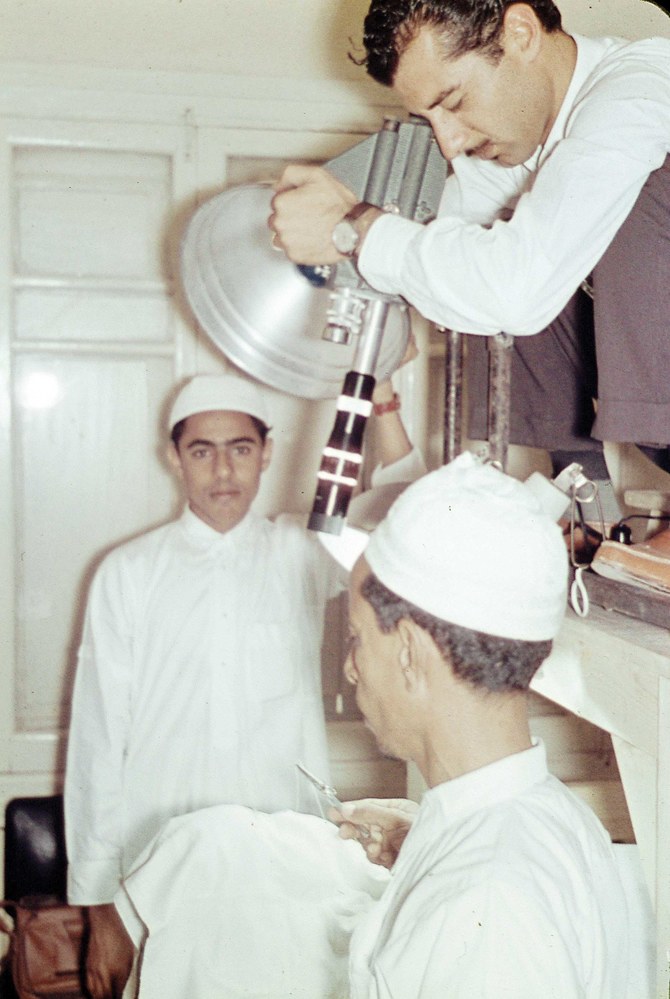JEDDAH: The Red Sea International Film Festival will honor Saudi photographer and cinematographer Safouh Naamani (1926-2016), one of the pioneers of color photography in the Kingdom.
The festival will present for the first time a rare documentary made by Naamani in 1963 on the journey to Hajj, in addition to a movie compiling never-before-seen footage of the city of Jeddah, taken by Naamani between 1954 and 1968.
The restored version of “The Pilgrimage to Makkah” (1963) and “Glimpses of Jeddah,” a film composed of archival footage starting from 1954, will both premiere at the inaugural Red Sea festival from March 12-21 in Jeddah.
“The Pilgrimage to Makkah” is a 35-minute color documentary film, developed at the William Palmer laboratory in San Francisco, about the pilgrimage to Makkah, filmed during the 1963 Hajj season.
Naamani used his extensive knowledge of the holy city to deliver an authentic perspective. The documentary captures Makkah’s inspiring landscapes and religious rituals while presenting the journey of pilgrims to Makkah. Previously, the film has screened in private or limited shows, and so will now be presented publicly for the first time.
“This discovery rewrites the history of national cinema in our country,” festival director and CEO, Mahmoud Sabbagh, said. “Discovering a film that was made in 1963 and that is complete in all aspects and production adds an original element to the story of Saudi cinema.”
The festival also presents for the first time a cinematic panorama of the city of Jeddah, captured by Naamani between 1954 to 1968 on his 16mm camera.
The rare collection of footage documents the history of urban transformation that the city went through during the 50s and 60s.
FASTFACTS
• The Red Sea International Film Foundation developed and restored five reels of raw film belonging to Naamani at a film restoration lab in Munich, Germany.
• The restored footage has been edited into a 30-minute film, which will debut at the 2020 festival.
• The festival will present for the first time a rare documentary made by Naamani in 1963 on the journey to Hajj.
The Red Sea International Film Foundation developed and restored five reels of raw film belonging to Naamani at a film restoration lab in Munich, Germany. The restored footage has been edited into a 30-minute film, which will debut at the 2020 festival.
Scenes from the film “Glimpses of Jeddah” range from the celebrations of the return of King Saud after receiving medical treatment abroad in 1954, as well as footage of commercial life in the port of Jeddah. Naamani was also able to capture rare shots of the coastline along the ancient port of Punt (in Egypt), as well as Al-Bay’a Square, the Jeddah Palace Hotel and the Bakashab building. The film also contains rare footage of the creation of Gold Street in 1964.
Sabbagh said: “We are expanding our history with new narratives of Jeddah’s metamorphoses through rare cinematic documentation captured by the late filmmaker Safouh Namaani. It’s as if Namaani knew his work would be vital for generations to come.”
Naamani is one of the pioneers of photography and filmmaking in Jeddah. He started selling cameras and photography equipment in 1952 at his family-run “Al Naamani Stores” on King Abdul Aziz road, before establishing “Studio Safouh” in the Abdullah Alfaisal building for portrait photography and photographic film development.
Restoring the work of Naamani and presenting it to a Saudi audience is a key component of the Red Sea foundation, which is tasked with reviving, preserving and highlighting the heritage of Saudi cinema.





























